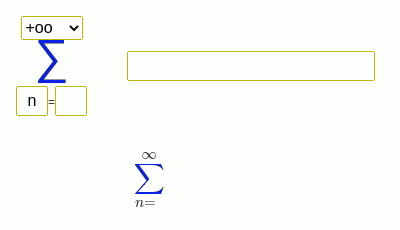Sum of series ((-1)^n)*x^2n/(2n+1)!
The solution
You have entered
[src]
oo ____ \ ` \ n 2 \ (-1) *x *n / ---------- / (2*n + 1)! /___, n = 1
$$\sum_{n=1}^{\infty} \frac{n \left(-1\right)^{n} x^{2}}{\left(2 n + 1\right)!}$$
Sum((((-1)^n*x^2)*n)/factorial(2*n + 1), (n, 1, oo))
The radius of convergence of the power series
Given number:
$$\frac{n \left(-1\right)^{n} x^{2}}{\left(2 n + 1\right)!}$$
It is a series of species
$$a_{n} \left(c x - x_{0}\right)^{d n}$$
- power series.
The radius of convergence of a power series can be calculated by the formula:
$$R^{d} = \frac{x_{0} + \lim_{n \to \infty} \left|{\frac{a_{n}}{a_{n + 1}}}\right|}{c}$$
In this case
$$a_{n} = \frac{n x^{2}}{\left(2 n + 1\right)!}$$
and
$$x_{0} = 1$$
,
$$d = 1$$
,
$$c = 0$$
then
$$R = \tilde{\infty} \left(1 + \lim_{n \to \infty}\left(\frac{n \left|{\frac{\left(2 n + 3\right)!}{\left(2 n + 1\right)!}}\right|}{n + 1}\right)\right)$$
Let's take the limit
we find
$$R = \infty$$
$$\frac{n \left(-1\right)^{n} x^{2}}{\left(2 n + 1\right)!}$$
It is a series of species
$$a_{n} \left(c x - x_{0}\right)^{d n}$$
- power series.
The radius of convergence of a power series can be calculated by the formula:
$$R^{d} = \frac{x_{0} + \lim_{n \to \infty} \left|{\frac{a_{n}}{a_{n + 1}}}\right|}{c}$$
In this case
$$a_{n} = \frac{n x^{2}}{\left(2 n + 1\right)!}$$
and
$$x_{0} = 1$$
,
$$d = 1$$
,
$$c = 0$$
then
$$R = \tilde{\infty} \left(1 + \lim_{n \to \infty}\left(\frac{n \left|{\frac{\left(2 n + 3\right)!}{\left(2 n + 1\right)!}}\right|}{n + 1}\right)\right)$$
Let's take the limit
we find
$$R = \infty$$
The answer
[src]
2 /cos(1) sin(1)\ x *|------ - ------| \ 2 2 /
$$x^{2} \left(- \frac{\sin{\left(1 \right)}}{2} + \frac{\cos{\left(1 \right)}}{2}\right)$$
x^2*(cos(1)/2 - sin(1)/2)

Examples of finding the sum of a series
- The Sum of the Power Series
x^n/n
(x-1)^n
- Factorial
1/2^(n!)
n^2/n!
x^n/n!
k!/(n!*(n+k)!)
- Flint Hills Series
csc(n)^2/n^3
- Basel problem
1/n^2
1/n^4
1/n^6
- Harmonic series
1/n
- Grandi's series
(-1)^n
- Alternating series
(-1)^(n + 1)/n
(n + 2)*(-1)^(n - 1)
(3*n - 1)/(-5)^n
(-1)^(n - 1)*n/(6*n - 5)
- Newton–Mercator series
(-1)^(n + 1)/n*x^n
- Exam the series for convergence
(3*n - 1)/(-5)^n

 1/4+1/28+1/70
1/4+1/28+1/70
 -6n(6n+6)+(6n-6)(6+6n)
-6n(6n+6)+(6n-6)(6+6n)